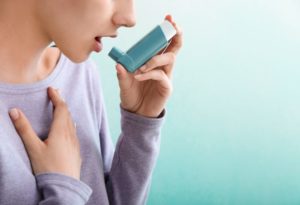
An estimated 27 million people in the U.S. have asthma. If you are among them, you should certainly do all you can to manage your condition. Part of that involves keeping a close eye on your oral health. Just how can asthma affect your oral health, and how can you minimize its impact on your smile? This blog post provides some important information.
Asthma and Oral Health
Asthma can contribute to dry mouth in a couple of different ways:
- When you are struggling to breathe, you are more likely to take in air through your mouth. This can cause some of your saliva to dry out.
- Asthma inhalers can repress your salivary glands, thereby reducing saliva production.
Dry mouth is uncomfortable, but that is just the beginning of how it can affect you. Saliva is important for your oral health. It rinses away bacteria and food particles that might otherwise linger in your oral cavity and contribute to tooth decay, gum disease, and bad breath. It also contains some minerals that play a role in keeping your tooth enamel in good shape. Without adequate amounts of saliva, your oral health could easily begin to decline.
Minimizing Your Risk
If you have asthma, there may be some practical steps you can take to lower your risk of cavities, gum disease, and bad breath:
- Try to avoid asthma triggers. Smoke, chemical fumes, pollen, and animal dander are all common asthma triggers. If possible, try to minimize your exposure to anything that might exacerbate your condition.
- Ask about an alternative inhaler. Some inhalers pose a greater risk for oral health than others — some even have sugar in them! Ask your primary care physician if you can use one that is unsweetened.
- Drink plenty of water. Drink some water after using your inhaler to encourage saliva production and rinse out your mouth.
- Regularly brush your teeth. In addition to brushing every morning and evening, it may also be helpful to carry a toothbrush with you so you can clean your mouth after using your inhaler.
- Talk to your dentist. Your dentist can help you monitor your oral health. If they notice early signs of tooth decay or gum disease, they can suggest appropriate treatment so the condition does not become severe.
Asthma should not be allowed to ruin your smile! Take some precautions so you can enjoy the many benefits of healthy teeth and gums.
Meet the Practice
Dr. George Keanna is a holistic dentist in Albuquerque with decades of experience. He has a strong focus on both helping patients enjoy good oral health and supporting their overall wellness. If you are concerned about how asthma or other medical conditions might be affecting your smile, Dr. Keanna and our team would be pleased to consult with you. Contact Natural Dental Services at 505-292-8533.
